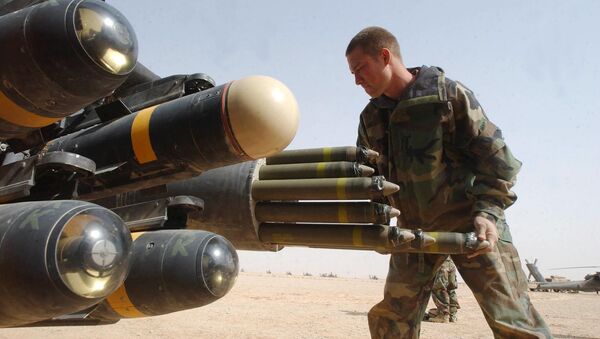Over the past 18 months, the US has conducted over 9,000 airstrikes against Daesh, also known as IS/Islamic State, in Iraq and Syria. Having little impact on the terrorist group, Washington has nevertheless dropped $1.3 billion worth of bombs and missiles, as of December 31.
That price tag is set to increase. As the Pentagon depletes its arms stockpile, the Obama administration is seeking some $1.8 billion to purchase 45,000 new smart bombs. If approved by Congress, this would represent a significant portion of the $7.5 billion the Pentagon is requesting to fight Daesh.
"This will be critical as our updated coalition military campaign plan takes hold," US Defense Secretary Ashton Carter said on Tuesday during a speech before the Economic Club of Washington. He added that the Pentagon is at "a major inflection point" and that it is taking “the long view” with a proposed $584 billion 2017 budget.
Carter laid out budget details, as well. Presumably referring to the B-52 bomber, he spoke of an an old aircraft platform to be used as an “arsenal plane, converting it into a flying launch pad for various forms of conventional payloads.
"In practice, the arsenal plane will function as a very large airborne magazine, networked to 5th-generation aircraft that act as forward sensor and targeting nodes – essentially combining different systems already in our inventory to create wholly new capabilities."
If granted, these budget proposals would seem to contradict an agreement to cut the Pentagon’s budget by $15 billion over a two-year period. Because of those restrictions, the money would likely have to be drawn from the Overseas Contingency Operations account, the Pentagon’s $59 billion failsafe for unexpected overseas expenditures.
The budget will sent to Congress next week.
The Pentagon’s need to increase its anti-Daesh campaign contradicts statements made by the US Air Force earlier this month.
"By the time we get to the end of 2016, I hope to be pretty well done with Daesh," Lt. Gen. Charles Brown Jr., commander of the US Air Forces Central Command, told Air Force Times. "Maybe that’s aspirational, but I think we are putting pressure on Daesh."
Given that fiscal year 2017 begins on October 1, right around the time that Brown’s prediction should come to pass, it seems that Secretary Carter and the Obama administration aren’t entirely confident in the timeline.




